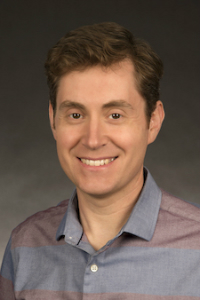
Dr. Andrew Holland
Department Chair - Full Professor
Office: PSC 145B, Pocatello / PSC 352, Pocatello
208-282-4373
Postdoctoral Studies, Heterogeneous Catalysis, University of California, Berkeley, 2002-2004
Ph.D. Organometallic Chemistry, University of California, Berkeley, 2002
Research area: Organometallic Chemistry, Inorganic Chemistry
Student experience required for research: CHEM 111, CHEM 112, enrolled in CHEM 301
Student experience gained from research: Synthetic methods, mechanistic methods, air-sensitive techniques, NMR.
Ideal preparation for: Graduate school in chemistry; petrochemical, specialty, and pharmaceutical chemical industries.
Research Focus
1) Basic Late Metal Complexes in Catalysis
Anionic heteroatom ligands on electron-rich late metal centers may serve both basic and nucleophilic functions, but are frequently too high in relative energy to be regenerated cleanly in catalytic systems. We are interested in exploring, from a mechanistic inorganic perspective, scenarios that might overcome that problem to enable new bond activation and formation reactivity. Specifically, we aim to use chelating nitrogen ligands to produce strongly basic catalysts that can heterolytically activate H-X substrates to yield nucleophilic M-X species. We explore this idea through the preparation and study of new transition metal complexes.
2) Microwave Heating in Organometallic Chemistry
Microwave heating has proved to be a powerful tool in the synthesis of ligands, and we are currently exploring the potential and origins of the apparent acceleration associated with the technique. This work includes both practical application of microwaves to the syntheses of ligands and their complexes, and investigation of the kinetic changes (or lack thereof) induced by microwave heating.
3) New Approaches to Inorganic Materials Synthesis
The synthesis of inorganic materials has historically been approached largely from an entirely empirical perspective, but rational synthesis using well-defined solution phase techniques and molecular precursors has shown promise as an approach to targeting specific surface structures, particle sizes, and other properties. We are currently exploring the preparation of novel molecular precursors for nanoparticles with photovoltaic applications.
Recent Publications
"Synthesis and Reactivity of Sterically-Hindered Amido-Phosphine Complexes of Rhodium and Iridium." K. R. Seipel, K. L. Myers, M. Nguyen, B. B. Twamley, A. W. Holland, Inorg. Chem., manuscript in preparation.
"Kinetics of Reductive Elimination from Pt(IV) as a Probe for Non-Thermal Microwave Effects." C. Lombard, K. L. Myers, Z. H. Platt, A. W. Holland. Organometallics, submitted.
"Microwave-Assisted Synthesis of Phenylene-Bridged Amino-Phosphine Ligands: Acceleration of N-Arylation and Aryl Fluoride Phosphorylation Reactions." K. R. Seipel, Z. H. Platt, M. Nguyen, A. W. Holland. J. Org. Chem.73, 4291-4294, 2008.
"New Fe/SiO2 Materials Prepared Using Molecular Precursors: Synthesis, Characterization, and Catalysis." A. W. Holland, G. T. Li, Ahmed M. Shahin, G J. Long, A. T. Bell, T. D. Tilley. J. Catal. 235-1, 150-163, 2005.
"Effects of Phosphine Chelation on the Reactivity of Monomeric Parent Amido Complexes: Synthesis and Reactivity of Such a Complex Bearing Monodentate Ligands," A.W. Holland, R.G. Bergman, J. Am. Chem. Soc.124, 14684-14695, 2002.
